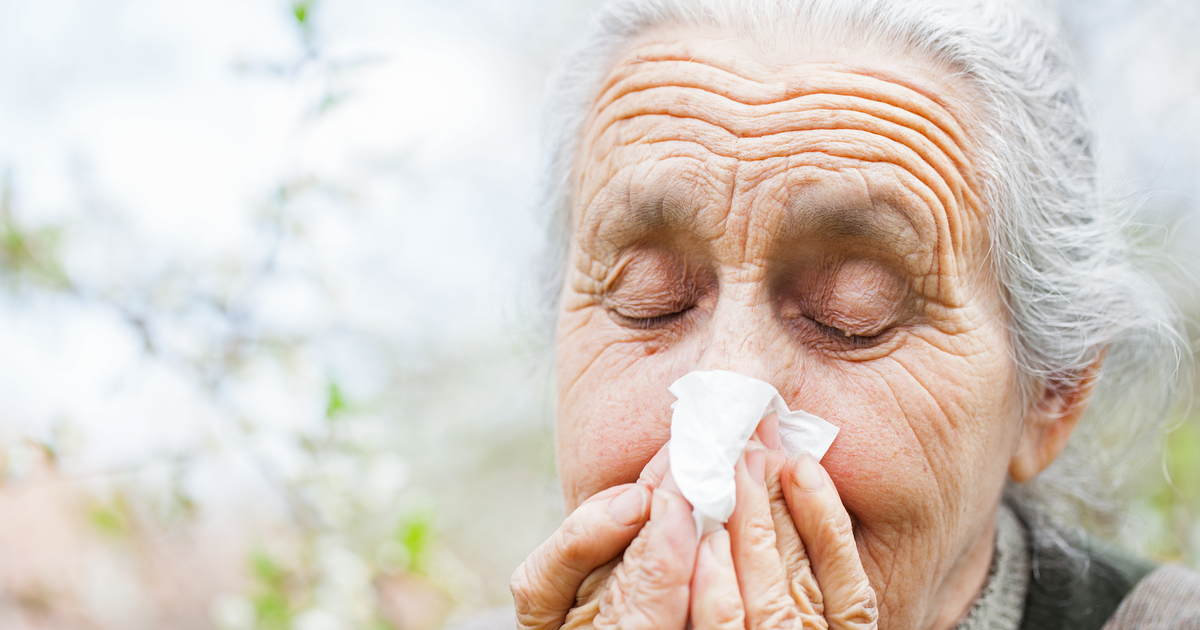Spring is a refreshing time of year punctuated by colorful blooming flowers and more sunshine as winter finally fades away. But springtime also ushers in allergy season for millions of Americans, as countless pollen particles and other allergens fill the air. As a result, scratchy throats, sneezing, runny noses, and itchy, watery eyes are common.
For those aged 65-and-over, allergy season presents more serious challenges; ones that can interfere with their health and wellbeing. And, when you’re serving as a caregiver for an aging in place loved one, that’s concerning. Fortunately, there are several effective ways to help at-home seniors deal with allergy season.
Why Allergies Impact the Elderly More
According to the Centers for Disease Control and Prevention (CDC), allergies are the sixth leading cause of chronic illness in the U.S. Many elderly persons also have other pre-existing medical conditions that affect breathing, like cardiovascular disease, lung cancer, or other kinds of pulmonary disease.
When exposed to environmental allergens that can further restrict their breathing, those seniors are placed at risk for a heart attack, shortness of breath, or other serious health problem. For many it’s stressful, and limits their outdoor activities, exercise and socializing.
Proven Ways for Seniors to Manage Allergies
If you are assisting a senior loved one who you suspect is experiencing seasonal allergies, there are several reliable ways to help make those times of year more tolerable, such as:
Look for Allergy Signs
In addition to the allergy symptoms mentioned earlier, seniors will oftentimes experience shortness of breath and fatigue when airborne allergen levels are high. Just because your loved one didn’t have an allergy before doesn’t mean they don’t now, as adult-onset allergies can occur at any age.
Notify Their Doctor
Healthcare professionals, including physicians, sometimes have a hard time diagnosing allergies in seniors because of their other chronic medical conditions. Patients with Alzheimer’s or other forms of dementia oftentimes can’t clearly articulate their symptoms. As a caregiver, you need to inform their doctor about any concerns you may have related to a potential allergy.
Don’t Delay
As was pointed out, allergies can place an elderly person with pre-existing cardiac or lung disease at significant risk. For that reason, don’t hesitate when it comes to getting them the allergy relief they need. Be leery of antihistamines. Most allergy sufferers today stop by the local pharmacy and grab an OTC antihistamine to treat their symptoms. In the elderly, antihistamines can sometimes induce side effects like drowsiness, confusion, urine retention, dry mouth and eyes, and dizziness. Those side effects can make accidental falls more likely, and induce other problems like urinary tract infections (UTIs). Speak with their doctor about alternative allergy treatments like a topical drug or nasal steroid.
Reduce Allergen Exposure
For the average sufferer, seasonal allergies are triggered by elevated levels of pollen or mold in their environment. Make it a point to monitor the news for daily pollen counts and allergy warnings, and avoid taking your loved one outside when alerts have been issued. When that’s impossible, like when they have a doctor’s appointment, encourage them to wear sunglasses to protect their eyes from allergens.
Around their home, keep windows closed when pollen counts are high, and make sure that their air conditioning unit and ducts are serviced regularly. Installing a High Efficiency Particulate Air (HEPA) filter on the A/C is advisable, along with using an air purifier. Keep their house as dust and dirt-free as possible, especially if they have a pet. Before visiting your loved one, make sure you wash your hands, shower, and change into clean clothing to eliminate introducing allergens into their home.
Dependable In-Home Allergy Season Care for Seniors
Helping aging in place seniors deal with allergy season in Alabama every year can be difficult, notably when you’re busy or live too far away. When you need some dependable in-home allergy assistance, call upon the caregiving professionals at Seniors Prefer Homecare. Our aides are highly-trained when it comes to allergy challenges seniors face, and can step in and help manage their allergies to put your mind at-ease. For starters, our experienced aides will ensure that your loved one’s home is clean and allergen-free.
While there, they can also carry out other reliable duties like personal hygiene, shopping, meal preparation, medication reminders, companionship, and transportation. All our in-home services can be flexibly-tailored within an affordable package that will make you, and your loved one, smile. To learn more about how seasonal allergies affect seniors, or the family-trusted home healthcare services we provide in the Tuscaloosa, and Huntsville, AL, areas, contact Seniors Prefer Homecare today, or visit www.seniorspreferhomecare.com now!

